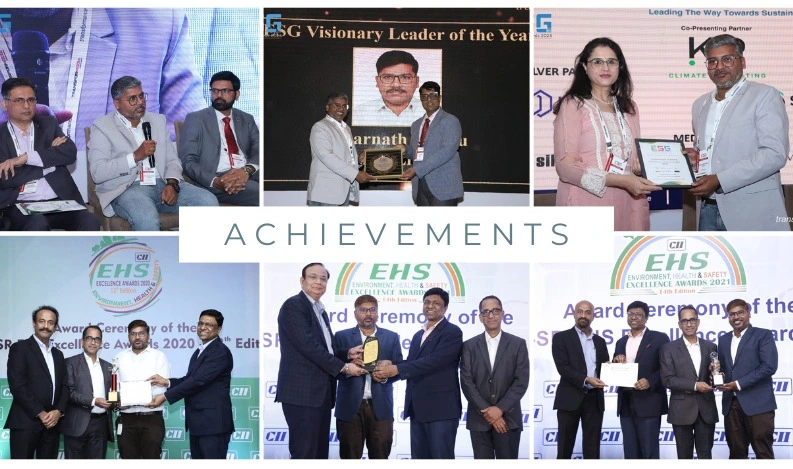
Amarnath Paluru: Driving Innovation and Excellence in EHS Leadership
Welcome to AllAroundWorlds.com’s latest journey article, where we have the privilege of delving into the remarkable career of Amarnath Paluru. As a distinguished leader in Environmental, Health, and Safety (EHS) and sustainability, Amarnath’s work is setting new benchmarks within the pharmaceutical industry. This article offers an insightful exploration of his professional journey and his pivotal role at Biocon Limited as the Senior Director and Cluster Head for EHS & Sustainability in the Visakhapatnam Region.
In this engaging interview, we start by uncovering Amarnath’s early life and educational background. From growing up in a region facing significant environmental challenges to pursuing advanced studies in Environmental Science, his formative experiences have profoundly shaped his commitment to sustainability and occupational health. His academic journey provided a solid foundation for his career, driving his passion for improving environmental and health standards.
As we delve deeper, we explore Amarnath’s path to leadership in EHS and sustainability. His career began in diverse industries, including manufacturing and Oil & Gas, before transitioning to the pharmaceutical sector. Discover how his early experiences, combined with his dedication to integrating sustainable practices, have propelled him to a leading role in the pharma industry.
We also address the major challenges Amarnath faces in promoting sustainability within the pharmaceutical industry, from navigating regulatory complexities to managing costs and global supply chain intricacies. Learn about the innovative technologies he is leveraging to enhance EHS programs and how his strategies go beyond regulatory compliance to foster a culture of sustainability.
Additionally, the article highlights Amarnath’s perspectives on emerging trends shaping the industry, such as circular economy initiatives, green chemistry, and climate change mitigation. We also gain insights into the pharmaceutical sector’s significant role in the Indian economy, showcasing how sustainability practices are contributing to both environmental and economic advancements.
For aspiring startups and professionals, Amarnath shares invaluable advice on integrating sustainability into core business strategies, staying ahead of emerging trends, and fostering a culture of continuous improvement. His insights provide a roadmap for those looking to make a meaningful impact in the field of EHS and sustainability.
Join us as we explore the inspiring journey of Amarnath Paluru, a leader who is driving change and shaping the future of sustainability in the pharmaceutical industry.
Early Life and Educational Background
Amarnath Paluru's journey began with a profound connection to environmental issues, which was shaped by his upbringing in a region grappling with environmental challenges. This early exposure ignited his passion for sustainability and health. His academic journey began with a degree in Environmental Science, followed by advanced studies in management systems and Sustainability. His educational background provided him with the technical expertise and knowledge required to address complex EHS issues within the pharmaceutical industry. His dedication to understanding and improving environmental and health standards has been a driving force throughout his career.
Journey to Leadership in EHS & Sustainability
Amarnath Paluru's career trajectory in EHS and sustainability has been marked by a combination of personal motivation and professional dedication. His early interest in these fields was sparked by growing up in an area affected by environmental issues, which ignited a passion for addressing such challenges. Furthering his education with degrees in environmental science and advanced studies in sustainability provided him with the technical foundation required for his role.
Beginning his career in various industries, including manufacturing and Oil & Gas, Amarnath built a robust foundation in EHS principles. His transition to the pharmaceutical industry was driven by a desire to impact public health positively through safer drug production and sustainable practices. His role involved leading significant EHS projects and implementing comprehensive management systems. Addressing compliance issues and integrating sustainability into pharmaceutical operations have been central to his career.
Top Challenges and Strategies in Sustainability
Amarnath identified three major challenges in promoting sustainability within the pharmaceutical industry:
1. Regulatory Compliance: Navigating complex regulatory frameworks is a significant challenge. To address this, Amarnath emphasises close collaboration with regulatory bodies and advocates for supportive regulations. Conducting internal audits and training programs helps ensure compliance and readiness for regulatory changes.
2. Cost Management: The high costs associated with sustainability initiatives and the uncertain returns on investment can be daunting. Amarnath’s strategy includes performing detailed cost-benefit analyses, implementing projects in phases, and seeking out incentives and funding opportunities to manage expenses effectively.
3. Global Supply Chain Complexity: The complexity of global supply chains poses challenges for sustainability. Amarnath tackles this by engaging with suppliers, conducting regular audits, and implementing measures to ensure transparency and traceability throughout the supply chain.
Innovative Technologies in EHS
The pharmaceutical industry is integrating innovative technologies into its EHS programs to enhance compliance, safety, and environmental impact reduction:
- Digital Monitoring and Reporting: The Internet of Things (IoT) allows for real-time environmental monitoring, while data analytics and AI provide insights for predicting hazards and optimising resource use.
- Wearable Technology: Devices such as smart helmets and glasses monitor worker safety by tracking vital signs.
- Sustainable Practices: Green chemistry and energy management systems are being adopted to reduce hazardous substances and improve energy efficiency.
Exceeding Regulatory Compliance
-
Pharmaceutical companies are taking proactive measures to exceed regulatory compliance, driven by a commitment to sustainability and corporate responsibility:
- Green Chemistry and Sustainable Manufacturing: Efforts to reduce hazardous substances and implement sustainable manufacturing practices help minimise environmental impact.
- Waste Management and Water Conservation: Effective waste management and water conservation practices reduce pollution and resource consumption.
- Eco-Friendly Packaging: Adoption of sustainable materials and packaging solutions minimises environmental footprint.
These measures not only enhance brand reputation but also lead to cost savings and prepare companies for future compliance challenges.

Fostering a Culture of Sustainability
To instil a culture of sustainability within organisations, Amarnath employs several key strategies:
- Leadership Commitment: Securing support from senior management is crucial for driving sustainability initiatives.
- Education and Training: Comprehensive training programs are implemented to raise awareness and equip employees with necessary skills.
- Employee Engagement: Initiatives such as sustainable commuting programs, waste reduction efforts, and energy conservation measures effectively engage staff in EHS practices.
Emerging Trends and Industry Response
Several emerging trends are shaping the pharmaceutical industry’s approach to EHS and sustainability:
- Circular Economy Initiatives: Companies are focusing on reducing waste and enhancing recyclability through innovative practices.
- Green Chemistry: There is a growing emphasis on minimising hazardous substances and developing greener alternatives.
- Climate Change Mitigation: The industry is setting ambitious carbon neutrality targets and investing in renewable energy sources.
- Digitalization and Data Analytics: Advanced tools are transforming EHS management with better monitoring and predictive capabilities.
- Water Stewardship: Managing water usage and contamination is becoming increasingly important, with companies adopting water stewardship practices.
Pharmaceutical companies are responding by setting ambitious goals, investing in research and development, and enhancing transparency and reporting practices to address these trends.
Pharma’s Role in the Indian Economy
The pharmaceutical industry is a crucial component of the Indian economy, contributing significantly to GDP and employment while prioritising EHS and sustainability:
- Waste Management and Green Chemistry: Efforts to manage waste and implement green chemistry practices reduce environmental impact.
- Workplace Safety and Product Efficacy: Rigorous safety protocols and adherence to global standards ensure employee safety and product quality.
- Community Health Programs: Corporate social responsibility initiatives enhance rural healthcare infrastructure and community well-being.
Advice for Aspiring Startups
For aspiring startups and young professionals in the field, Amarnath offers valuable advice:
"Focus on integrating sustainability into your core business strategies from the outset. Stay informed about emerging trends, invest in innovative technologies, and foster a culture of continuous improvement and employee engagement. Building a solid foundation in EHS will not only help you meet regulatory requirements but also position you as a leader in sustainable practices."
The Future of EHS and Sustainability in Pharma
The pharmaceutical industry is at a pivotal moment in its approach to EHS and sustainability. Trends such as circular economy initiatives, green chemistry, and climate change mitigation are reshaping the sector. Amarnath's leadership in pharma industry exemplifies how proactive measures and innovative technologies can lead the way in sustainability. By setting ambitious goals and investing in R&D, the industry is not only enhancing its environmental stewardship but also contributing to a more sustainable and resilient global future.
Conclusion
In conclusion, Amarnath Paluru's journey through the realms of Environmental, Health, and Safety (EHS) and sustainability is a testament to his unwavering commitment to improving industry standards and fostering a greener future. His leadership not only highlights the crucial role of sustainability in the pharmaceutical sector but also exemplifies how innovative strategies and technologies can drive meaningful change. As the industry continues to evolve, Amarnath’s insights and proactive measures offer valuable lessons for professionals and organisations striving to enhance their EHS and sustainability practices.
We encourage you to connect with Amarnath Paluru on LinkedIn to stay updated on his latest initiatives and to gain further insights into the evolving landscape of EHS and sustainability in the pharmaceutical industry. His expertise and forward-thinking approach are sure to provide inspiration and guidance for anyone passionate about making a positive impact in these critical fields. Thank you for joining us on this journey of exploration and innovation with one of the leading voices in the industry.
Also Read:-



Recent Comments:
No comments yet.